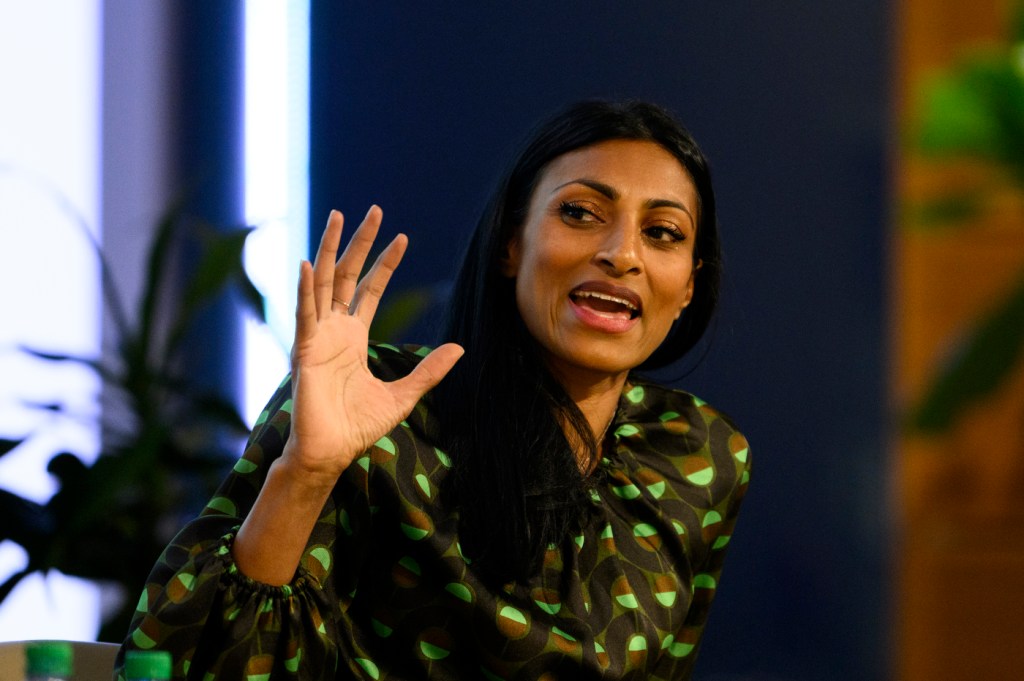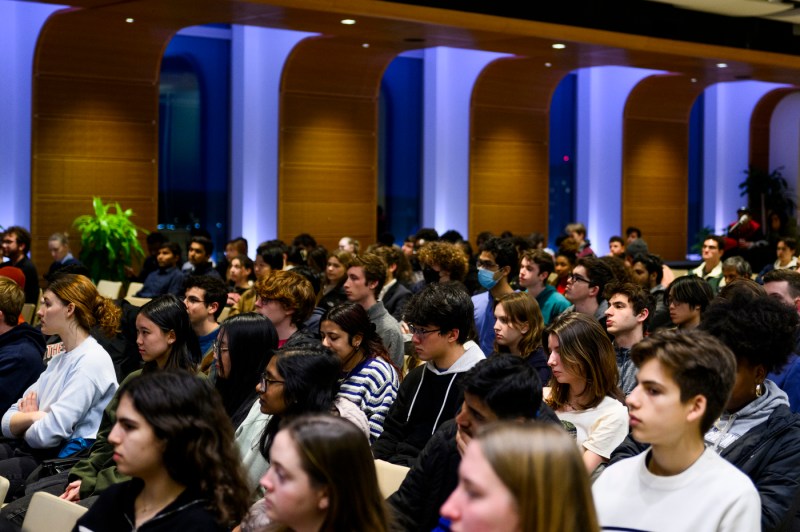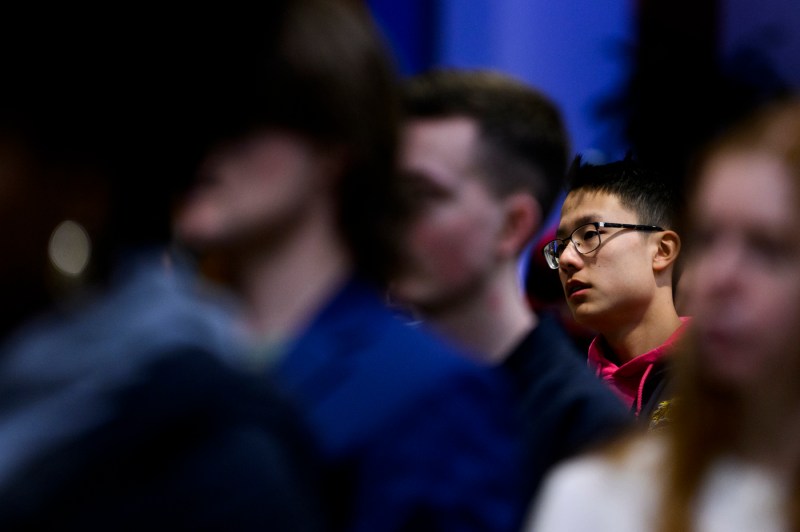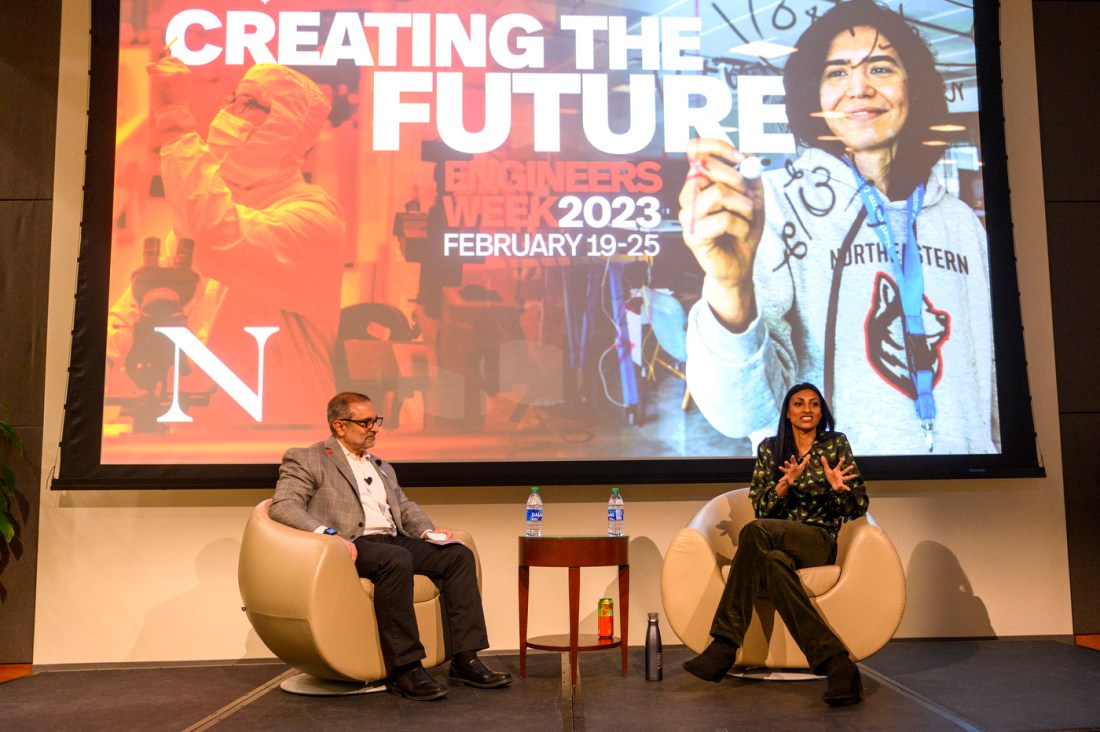Engineers are ‘unsung heroes’ and Northeastern students ‘have the courage to push boundaries and be visionary’

“That’s one small step for man, one giant leap for mankind.”
Famously spoken by Neil Armstrong as he stepped foot on the lunar surface in 1969, those words have echoed through history and resonated with generations of people who have marveled at the technological achievement of the first lunar landing. That includes Shini Somara, a mechanical engineer and media luminary behind Al Jazeera’s “TechKnow” and PBS’ “Crash Course Physics” educational series.
As part of Northeastern University’s Engineers Week, Somara stopped by East Village on Wednesday for a fireside chat with Gregory Abowd, dean of the College of Engineering at Northeastern. During the wide-ranging conversation, Somara discussed the small steps that have led to giant leaps in her own career, her new book and why engineering is “the most exciting profession” right now.
“Engineers really can make a difference,” Somara said. “I really believe engineers are unsung heroes. They have such a massive impact on society, and I don’t think engineers are given the credit they deserve. … It sounds like a massive, lofty statement, but, honestly, engineering really has the power to change our futures.”



Somara’s story––her journey from mechanical engineer to media personality––is a testament to the transformative power of engineering.
Her father, who left Sri Lanka for the U.K., was a successful engineer in his own right and remains her biggest inspiration. She followed in his footsteps, studying mechanical engineering during her undergraduate program before pursuing her Ph.D. at Brunel University in London with a focus on computational fluid dynamics.
It was also during her doctorate program that she was introduced to communications, media and the power “to translate very complex language into something that was engaging, where you could literally see the lights in people’s eyes go [on].”
From that moment on, she became addicted to generating that light bulb moment for audiences.
She started behind the camera, researching, editing and assistant producing for television before transitioning in front of the camera on shows like the BBC’s “The Health Show” and BBC America’s “No Kitchen Required.”
Her first big break in America came in 2013 when she started hosting “TechKnow,” an Al Jazeera talk show focused on innovations in technology and science. Then, in 2016, she helped create PBS Digital Studios’ “Crash Course Physics,” a free online series of educational videos designed to explain complicated physics concepts simply and intuitively. It proved to be a major success for Samara, even if she was warned it might kill her career to go into online media at the time.
“[My dad] was lucky to go to school and ended up becoming a great engineer,” Somara said. “I was like, ‘I want to do that for other people. I want to give people a chance to educate themselves,’ and ‘Crash Course Physics’ was the best way to do that.”
“Education, for me, is absolutely key, and it’s one of the reasons why I love engineering,” she added. “It’s one of these courses or modes of study that gives you such life-long skills.”
In 2018, Somara continued the Crash Course series with “Crash Course Engineering,” which is also when she first encountered Luke Landherr, distinguished teaching professor of chemical engineering at Northeastern. Landherr served as a consultant on the 50-video series and helped Somara essentially invent an AP course in engineering.
Now, Somara is spreading the word about “Engineers Making a Difference,” her seventh book and her “most significant book project.” Set for a March 2 release, the book tells the stories of 46 engineers from a diverse set of backgrounds and with a diverse set of engineering interests.
“They all love solving problems, and they’re all super curious,” Somara said. “They just want to keep learning, and they’ve got a really healthy relationship with failure.”
In writing the book, Somara is “now more convinced than ever about the importance of what engineers do.” The process has also helped Somara tell the story of an industry that is somewhat more open to engineers like her who break the mold of what engineers are stereotypically thought to be.
“I now see engineers truly being themselves, pursuing their genuine interest in their chosen fields, and I’m positively encouraged by the engineers I’m meeting, including here today at Northeastern,” she said. “They have the courage to push boundaries and be visionary and invent things and get creative.”
Now more than ever, Somara is confident that engineering is “the most exciting profession” that students can go into. There is still space for small steps and giant leaps.
“I now really am convinced that engineering is probably the most exciting profession that you can go into purely because it’s like uncharted territory,” Somara said. “You study engineering, you get these amazing skills and then you go out to industry, and you basically invent stuff. You use your ingenuity. The world is your oyster when you have engineering skills.”
Cody Mello-Klein is a Northeastern Global News reporter. Email him at c.mello-klein@northeastern.edu. Follow him on Twitter @Proelectioneer.





